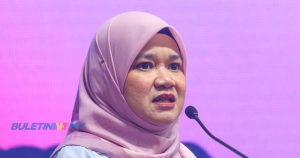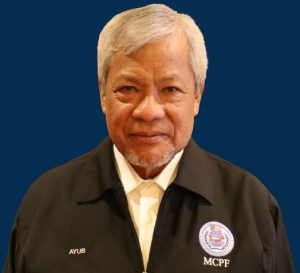KUALA LUMPUR – Subang MP Wong Chen has addressed arguments against the Health Ministry’s proposed generational tobacco ban, namely illicit cigarettes, impact on small retailers, and a slippery slope towards other prohibitions.
The PKR lawmaker reiterated to radio station BFM in an interview yesterday that he supports the Tobacco and Smoking Control Bill, after previously stating his stance in a CodeBlue poll of 40 MPs across the aisle about whether they would vote for the proposed tobacco control legislation.
Wong explained to BFM that he was in favour of Health Minister Khairy Jamaluddin’s proposal to prohibit smoking and vaping for anyone born after 2005 from a fiscal point of view, noting that the health cost from smoking tobacco is RM4 for every RM1 of excise duty collected from cigarettes.
“I would support the generational end game (GEG) plan of the government, but subject to understanding and looking at the draft bill properly,” Wong said.
“If it’s possible to stop an entire generation – not stop entirely – but bring it down to 5 per cent, that’s a good thing.”
According to the National Health and Morbidity Survey (NHMS) 2019, Malaysia’s national smoking prevalence is 21.3 per cent, with 4.9 million Malaysians aged 15 years and older who currently smoke.
Smoking rates are much higher among men; about four in 10 males in Malaysia smoke. Nearly half of adult men in every age group, except teenagers aged 15 to 19 with a 24 per cent smoking prevalence, currently smoke.
Sunset Clause To Drop Ineffective Policies After Review
Wong proposed a sunset clause in the tobacco bill for the GEG to enable a review of various policies in the legislation after studying their effectiveness for a certain period, such as one or two years after the law is fully implemented in its entirety.
“If you have 10 policies, you put it all out there, wait six months or a year for feedback to come through. Analysts will say, okay, five policies are working, we do that. The other five, we can consider dropping after hearing feedback from other people.
“You hit everything, wait for feedback, then readjust.”
He pointed out that when the previous Najib administration introduced the goods and services tax (GST), the government gave a one-year leeway for accountants and companies to adjust to the legislation.
“I would like Khairy to say, while debating this issue, that he has a vision to get it back and to be fair to everybody – what is effective and what is not. Come back with a sunset provision [and say], ‘I’m willing to drop some of these policies that we’re not able to effectively implement’.
“If he can do that, I think he may get more traction from among MPs because that’s just being reasonable.”
Illicit Cigarette Trade Argument Is Circular
On the point about the high smuggling of illegal cigarettes into Malaysia – which have been raised by Muar MP Syed Saddiq Syed Abdul Rahman and Petaling Jaya MP Maria Chin Abdullah – Wong pointed out that the solution to a black market is to increase funding for Customs and border patrols.
He also dismissed arguments by tobacco companies that raising taxes on cigarettes would expand illicit cigarette trade.
“In the short term, of course, market forces, whether legal or illegal, will drive up prices and supply of illegal stuff. But our job is to fight the illegal influx of cigarettes and alcohol and cooking oil,” Wong told BFM.
“I do appreciate what tobacco companies tell us from time to time, but I think the argument is circular and it doesn’t really address the issue we have — governance issue, effectiveness issue in our authorities, so those need to be improved.”
He also questioned if the government would raise excise duty on cigarettes, noting that tobacco taxation in Malaysia has not yet reached the ideal level of 70 per cent.
‘No Way’ Cigarettes Form Half Of Retailers’ Sales
Wong questioned the percentage of cigarettes from sales by retailers like coffee shop operators that have objected to Khairy’s proposal to ban the sale of cigarettes, tobacco, and vape to anyone born from January 1, 2005.
“If we save RM3 billion to RM4 billion in health costs, are we going to lose a billion or two, or RM5 billion, from retail revenue? I don’t think so,” the PKR MP told BFM.
He suggested allowing the generational tobacco ban to run for six months or a year before analysing the budget and fiscal impact.
“If you can’t sell cigarettes, you can sell other things. What is a cigarette component to your total sales? Fifty per cent? No way. Go to any shop out there, they sell hundreds of products,” Wong said.
“I understand you want to make money, I know times are tough, but you must understand, from the human perspective, this is a serious matter.
“No country in the world says smoking is great for the economy. There will be winners and losers in every legislation. Death from cigarettes and smoking – this is a no brainer in that sense.”
We’re Talking About Tobacco, Not Alcohol
Wong acknowledged that some MPs – whom he declined to name – have told him that they feared approving a generational smoking prohibition would lead to a slippery slope towards the ban of other products like alcohol.
Syed Saddiq and Beruas MP Ngeh Koo Ham have publicly cited such concerns. Although Umno strongman and Padang Rengas MP Mohamed Nazri Abdul Aziz expressed strong support for the tobacco bill, he told CodeBlue that the government must resolve the generational ban’s constitutional conflict with personal liberties.
“Let’s be very clear,” Wong told BFM. “Cigarettes and alcohol are two different things.”
He pointed out that there is no upcoming bill proposing to ban alcohol, saying: “Every legislation that comes on has to be judged on its own.”
The PKR lawmaker also said it’s very rare for young people to get drunk as alcoholic drinks are generally more expensive than cigarettes, but there are far more youths who smoke but do not consume alcohol.
He noted that there are already legislations criminalising dangerous behaviours like drunk driving or assault when intoxicated.
Government Must Consult Opposition MPs
Wong suggested a three-strike policy for penalties under the generational ban on smoking and vaping, like in the United States. The three-strike rule is a criminal sentencing structure that imposes significantly harsher punishments on repeat offenders.
“We need that one-year to two-year leeway where you don’t fully enforce everything, you allow some flexibility so we can gather data. Data-driven policy is essential,” Wong added.
He questioned how penalties would be imposed under the tobacco bill, such as whether the licences of offending retailers would be revoked, which would fall under local authority jurisdiction, or whether fines would be meted out, which would fall under the federal government.
He also asked whether young people aged 18 next year or under – should Parliament approve the Tobacco and Smoking Control Bill – would be punished with a high fine should they be caught smoking, or if penalties would be targeted at the retail outlet from which the person born after 2005 bought their cigarettes from.
“For retailers, if an item is banned for young people, they just can’t sell it there. You can easily track, most of these shops do track their own consumers. Once you use a credit card, you know who’s buying it.”
Wong said Khairy could be told to revise proposed penalties under the generational ban on smoking and vaping if MPs considered these to be excessive.
“That’s what I don’t like about how laws are passed here. There seems to be minimal consultation with Opposition MPs,” Wong complained.
“They may consult with CodeBlue or other health specialists out there, but we don’t really know what’s going on at this level for the legislator.”
MPs Representing Rural, Semi-Rural Constituencies May Reject Tobacco Bill
When BFM asked about the sentiments from other MPs about the proposed smoking GEG and the Tobacco and Smoking Control Bill, Wong said all lawmakers are very sensitive to their own constituents.
Wong said as a Member of Parliament, he needs to represent his constituents, even if he sometimes personally does not share his constituents’ beliefs.
“But generally, it’s almost 95 per cent aligned with the position of my constituents.”
He said his constituents in Subang, a middle class and upper middle class constituency of 480,000 people, are generally healthy and oppose smoking. Parents also have told him that they don’t want their children to take up the habit.
“So I’m very proud that both our views, my community and myself, are aligned.”
In rural or semi-rural constituencies, however, where smoking prevalence can be as high as 25 per cent, Wong noted that those MPs must be “sensitive to the needs of their constituents”.
“So I think it’s really up to them. I hope more will see our point of view – why this is so important, from a fiscal and health aspect.”
Wong believes that political parties are likely to allow their MPs to vote on the tobacco bill based on their conscience, as the proposed legislation isn’t seen as “political”.
“Some people are for choice, some people are like me who are more concerned about the health issue, so I think the parties are likely to let individual MPs decide for themselves.”
Khairy has yet to table the Tobacco and Smoking Control Bill or to brief MPs on it in the current Dewan Rakyat meeting that ends in two weeks.
The bipartisan Dewan Rakyat special select committee on health, science and innovation, chaired by Bandar Kuching MP Dr Kelvin Yii from the DAP, has requested a meeting with Khairy to present its suggestions for the tobacco bill before publishing them.
Resource: CodeBlue










